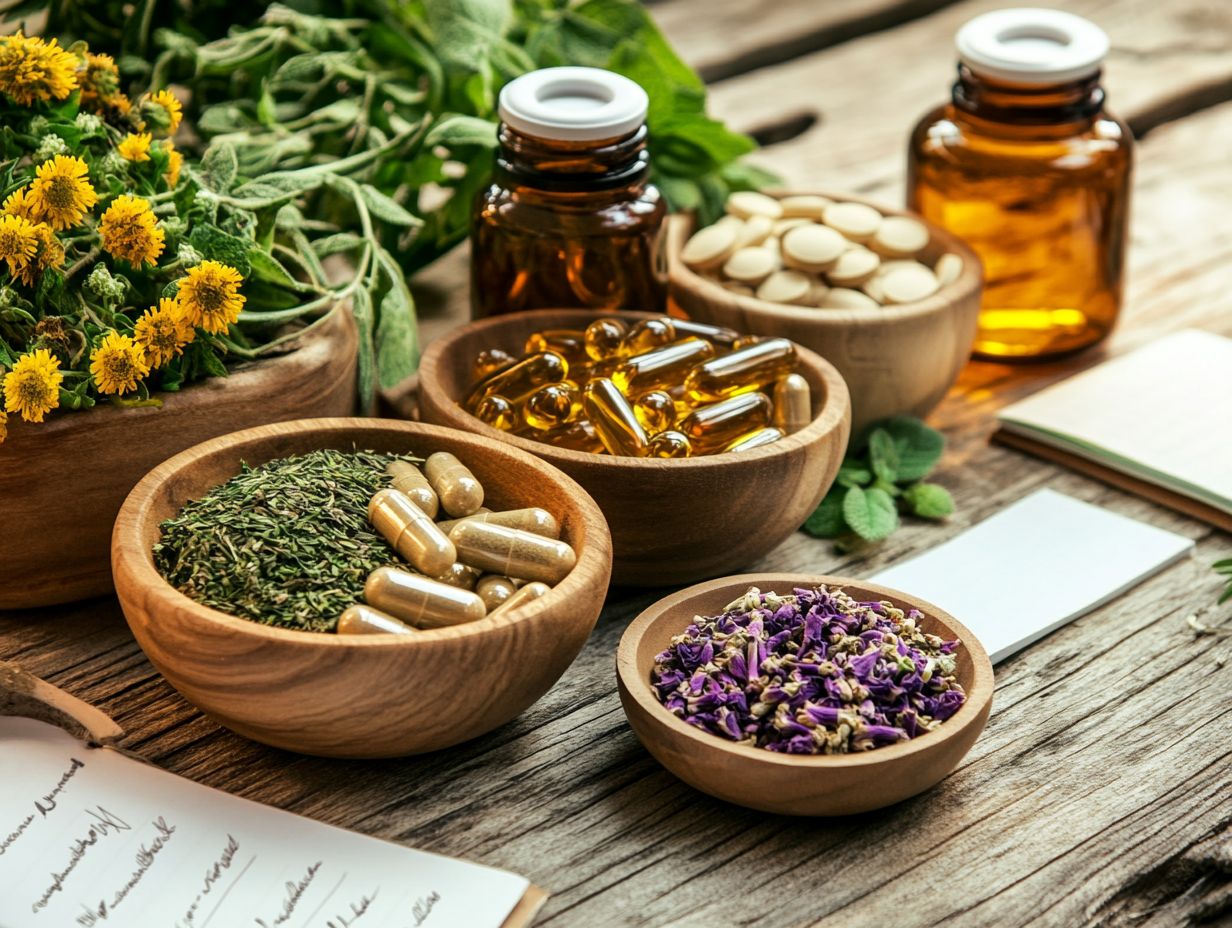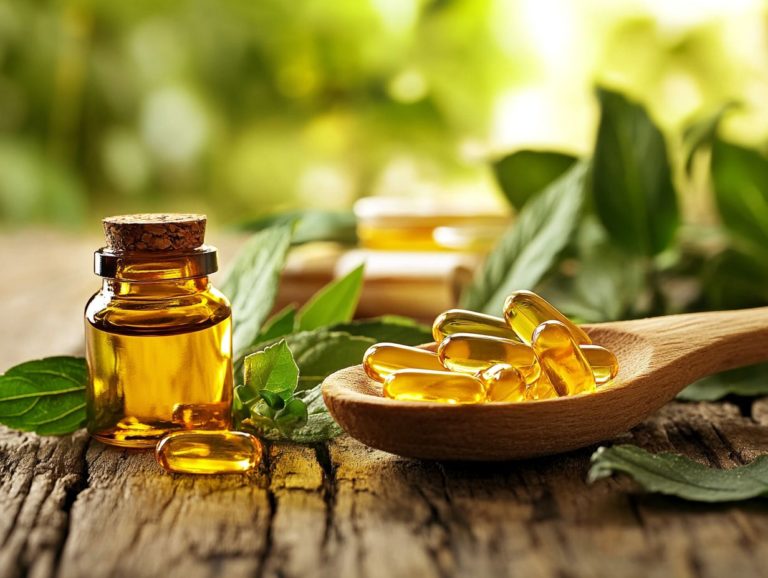Understanding Herbal Supplements: Benefits and Risks
Herbal supplements have surged in popularity as natural alternatives to conventional medicine. However, navigating this landscape can be quite complex. This article offers a comprehensive exploration of herbal supplements, delving into the various types available and the benefits they can provide.
It’s crucial to be aware of potential risks and interactions that might arise. You’ll receive guidance on how to select and use these supplements safely, along with alternatives if herbal options aren’t the best fit for you.
Get ready to dive into the exciting world of herbal supplements!
Contents
- Key Takeaways:
- What are Herbal Supplements?
- Benefits of Herbal Supplements
- Risks and Side Effects of Herbal Supplements
- How to Choose and Use Herbal Supplements Safely
- Alternatives to Herbal Supplements
- Frequently Asked Questions
- Curious about herbal supplements? You’re not alone!
- What are the potential benefits of using herbal supplements?
- What are the risks associated with using herbal supplements?
- How should I choose the right herbal supplement for my needs?
- Can herbal supplements be used in conjunction with traditional medications?
- Are there any precautions I should take when using herbal supplements?
Key Takeaways:

- Herbal supplements are natural products made from plants and are available in various forms such as capsules, pills, and teas.
- Consult with a healthcare provider before adding them to your routine.
- Research and consult with a healthcare provider to avoid risks such as interactions with medications and potential side effects.
What are Herbal Supplements?
Herbal supplements are natural products sourced from plants, celebrated for their potential health benefits. These supplements encompass a diverse array of herbal remedies, each recognized for its therapeutic properties, and they are frequently recommended by healthcare professionals.
Herbal products are becoming more popular, driven by an increasing consumer desire for natural alternatives to conventional medicine. It’s essential to know the quality of these products and consider the research that supports their efficacy and safety before weaving them into your health regimen.
Definition and Types
Herbal supplements come in various forms, such as extracts, capsules, teas, and topical solutions, each designed to serve specific roles in your health and wellness journey.
Among these options, extracts stand out as concentrated liquids made from plants that deliver potent doses of active ingredients. Capsules provide a convenient, tasteless alternative, perfect for those who are always on the move. Herbal teas offer hydration coupled with therapeutic benefits, all wrapped in a calming ritual.
For example, aloe is widely recognized for its skin-healing properties and its support for digestion. Echinacea is often sought after to enhance immune function. Then there’s St. John’s wort, renowned for its mood-lifting effects, making it a go-to choice for anyone looking to ease mild depression and anxiety.
Benefits of Herbal Supplements
Herbal supplements provide a range of benefits, often focusing on specific health conditions, bolstering your immune system, and serving as valuable complements to conventional medicines.
Common Uses and Evidence-based Benefits

Common uses of herbal supplements include helping with stomach issues, supporting the immune system, and managing stress and anxiety all of which are often backed by scientific evidence.
Take ginger, for example. It has long been celebrated for its ability to soothe stomach issues, with numerous studies showcasing its effectiveness in reducing nausea and promoting digestion. You might even find anecdotal accounts from individuals who claim that a simple cup of ginger tea transformed their uncomfortable days into manageable ones.
Then there s garlic, renowned for its immune-boosting properties. Studies show that eating garlic regularly can reduce the frequency of colds and infections. Many users share personal stories about how adding garlic to their diets has fortified their health, especially during changing seasons.
These examples highlight the value of herbal supplements, not just for tackling specific health challenges but also for enhancing overall well-being.
Risks and Side Effects of Herbal Supplements
Herbal supplements can indeed offer a wealth of health benefits, but they come with their own set of potential risks and unwanted effects. It’s essential to be mindful of possible drug interactions and adverse reactions that could arise, as highlighted in understanding the risks of dietary supplements.
Potential Interactions and Adverse Reactions
Potential interactions between herbal supplements and standard medical treatments can lead to unwanted effects, making it essential for you to approach these combinations with caution and consult a healthcare provider.
Take St. John’s wort, for example. It’s often chosen to alleviate symptoms of depression, but it can significantly diminish the effectiveness of certain antidepressants by influencing the substances in the liver that help break down drugs. If you’re using this herbal remedy, you might find that the therapeutic effects may be reduced or, in some cases, you could even experience withdrawal symptoms due to the sudden shift in medication efficacy.
Similarly, combining garlic supplements with blood thinners can increase the risk of excessive bleeding. To navigate these potential hazards, it’s crucial for you to engage in thorough discussions with healthcare professionals and monitor for any unusual symptoms before embarking on any herbal regimen.
How to Choose and Use Herbal Supplements Safely
Choosing and using herbal supplements safely requires a commitment to thorough research, consulting with a healthcare provider, and ensuring the highest quality of products. This careful approach minimizes risks and maximizes the potential benefits for your well-being.
Factors to Consider and Safety Precautions

When considering herbal supplements, focus on several key factors: the quality of the product, its potential health benefits, and the necessary safety precautions to avoid complications.
It’s vital to evaluate the sourcing of these products. The methods of cultivation and harvesting can greatly influence both the effectiveness and safety of the supplements. High-quality manufacturing standards are equally important; look for supplements that comply with rigorous regulations to guarantee their purity and potency.
Carefully review the available scientific evidence that supports the claims of these supplements. This will help you understand their benefits and risks. Remember, safety precautions are essential, especially regarding dosage recommendations. Too much can lead to unwanted effects.
Consulting with a healthcare provider before embarking on any herbal regimen is a wise choice. This ensures that your treatment aligns with your individual health needs while minimizing potential side effects.
Alternatives to Herbal Supplements
While herbal supplements can indeed offer benefits, don t wait discover the power of a range of alternatives. There are numerous natural remedies and treatment options that can complement or even replace conventional medicines, providing you with a broader spectrum of choices for your health and well-being.
Other Natural Remedies and Treatment Options
Various natural remedies and treatment options await you as viable alternatives to herbal supplements. These encompass lifestyle changes and conventional medical approaches tailored to your unique health needs.
For instance, by modifying your diet to feature more whole foods like fruits, vegetables, and whole grains, you can significantly enhance your overall health and vitality. In addition, incorporating mindfulness practices like meditation and yoga can boost your mental well-being and reduce stress often a precursor to various health issues.
One patient recounted their journey of overcoming anxiety through a daily meditation routine, highlighting remarkable improvements in both their mood and coping mechanisms. These personal experiences serve as a testament to the effectiveness of natural remedies, especially when paired with a dedicated commitment to your overall wellness.
Frequently Asked Questions
We encourage you to be proactive about your health choices. If you have any more questions or would like further information, please don’t hesitate to ask!
Curious about herbal supplements? You’re not alone!

Herbal supplements are products made from plants or plant extracts that are used for medicinal or health purposes. They are popular because many people see them as natural and potentially safer alternatives to traditional medications.
What are the potential benefits of using herbal supplements?
Herbal supplements have been used for centuries to promote overall health and treat various conditions.
Some potential benefits include relief from inflammation, improved digestion, and enhanced immune system function. Get ready to discover how these supplements can positively impact your health!
What are the risks associated with using herbal supplements?
While herbal supplements may be natural, they are not always safe.
Some supplements may also affect other medicines or have side effects. Concerns about their purity and quality exist as well. It is important to consult with a healthcare professional before taking any herbal supplement.
How should I choose the right herbal supplement for my needs?
Not all herbal supplements are created equal, so it’s crucial to do your research and choose a reputable brand.
Consider factors like the ingredients, the amount you should take, and potential interactions with other medications. Always consult with a healthcare professional for personalized recommendations.
Can herbal supplements be used in conjunction with traditional medications?
In some cases, herbal supplements can be used alongside traditional medications.
However, it is crucial to consult with a healthcare professional before combining any supplements with medicines. They can help identify potential interactions and ensure safe and effective use.
Are there any precautions I should take when using herbal supplements?
Yes, it is important to always follow the recommended dosage.
Avoid taking more than the suggested amount. Always inform your healthcare provider about any supplements you are taking, as they may affect certain medical conditions or interact with other medications.
Lastly, be sure to purchase herbal supplements from reputable sources and check for any potential allergens.






